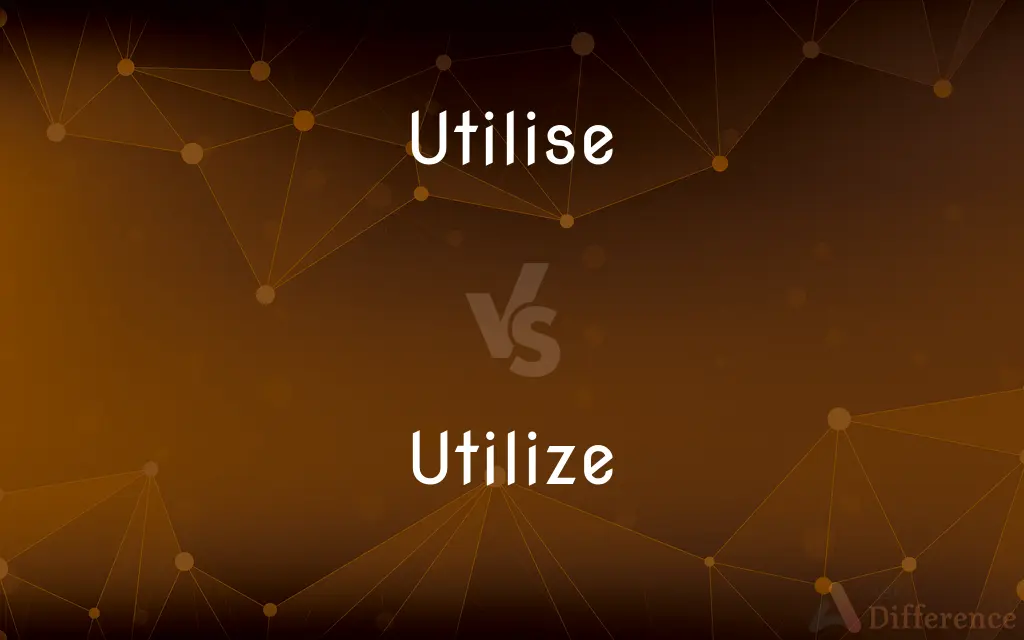Utilise vs. Utilize — What's the Difference?
Edited by Tayyaba Rehman — By Fiza Rafique — Updated on May 27, 2024
"Utilise" and "Utilize" mean the same, implying 'to make use of,' but differ in regional usage. "Utilise" is British English, while "Utilize" is American English.

Difference Between Utilise and Utilize
Table of Contents
ADVERTISEMENT
Key Differences
"Utilise" is the preferred spelling in British English, often seen in the UK and other Commonwealth countries. It is used to describe the act of making practical and effective use of something. "Utilize", while is the American English spelling, commonly used in the United States. Despite the difference in spelling, it carries the same meaning and usage as "utilise."
Both "utilise" and "utilize" originate from the Latin word "utilis," meaning useful. This shared origin reflects their identical meanings and uses in their respective language variants.
In academic and formal writing, "utilize" is more prevalent in American English contexts, while "utilise" is dominant in British English settings. For example, a British academic paper might state, "Researchers will utilise advanced techniques," whereas an American counterpart would write, "Researchers will utilize advanced techniques."
The primary difference between "utilise" and "utilize" is regional spelling preference, with no distinction in meaning or usage.
Comparison Chart
Meaning
To make use of
To make use of
ADVERTISEMENT
Common Usage
British English
American English
Spelling Variation
Ends in "-ise"
Ends in "-ize"
Example Usage
"He will utilise the tools available"
"She will utilize the resources provided"
Related Words
Realise, finalise
Realize, finalize
Compare with Definitions
Utilise
"Utilise" is the more common term in British English.
Utilize
To turn to profitable use or account.
Farmers utilize the manure as fertilizer.
Utilise
To avail oneself of.
She utilises her skills to train others.
Utilize
To employ for a given purpose.
The mechanic will utilize the right tools for the job.
Utilise
To put into service effectively.
They utilise solar energy to power the house.
Utilize
To make use of especially for practical reasons.
The city will utilize vacant lots for community gardens.
Utilise
To use resources to maximum advantage.
Businesses should utilise their assets wisely.
Utilize
To use effectively.
He can utilize the internet for research.
Utilise
To convert to practical use.
Rainwater is utilised for gardening.
Utilize
To harness resources for benefit.
She utilizes her knowledge to write books.
Utilize
Make practical and effective use of
Vitamin C helps your body utilize the iron present in your diet
Utilize
To put to use, especially to make profitable or effective use of
An approach to the problem that utilizes the latest research.
How plants utilize nutrients to produce seeds.
Utilize
Alternative spelling of utilise.
Utilize
To make useful; to turn to profitable account or use; to make use of; as, to utilize the whole power of a machine; to utilize one's opportunities.
In former ages, the mile-long corridors, with their numerous alcoves, might have been utilized as . . . dungeons.
Utilize
Put into service; make work or employ (something) for a particular purpose or for its inherent or natural purpose;
Use your head!
We only use Spanish at home
I can't make use of this tool
Apply a magnetic field here
This thinking was applied to many projects
How do you utilize this tool?
I apply this rule to get good results
Use the plastic bags to store the food
He doesn't know how to use a computer
Utilize
Convert (from an investment trust to a unit trust)
Common Curiosities
Are "Utilise" and "Utilize" synonyms?
Yes, they have the same meaning but differ in regional usage.
Is the difference between the two just the "s" and "z"?
Yes, the primary difference is the "-ise" in "Utilise" and "-ize" in "Utilize."
Which is the British English variant?
"Utilise" is the British English variant.
Can I use "use" instead of "Utilise/Utilize"?
Yes, "use" is a simpler alternative, but "Utilise/Utilize" can sometimes sound more formal.
Which is preferred in American English?
"Utilize" is preferred in American English.
Can an American writer use "Utilise"?
While "Utilize" is standard in American English, an American writer can use "Utilise" if targeting a British audience.
Do these words have the same root?
Yes, both derive from the Latin "uti," meaning "to use."
Is "Utilise" used in other English-speaking countries outside the UK?
Yes, "Utilise" is also common in countries like Australia and New Zealand.
Why might someone choose "Utilize" over "use"?
"Utilize" might be chosen for a more formal tone or to emphasize effective, specific, or practical use.
Share Your Discovery

Previous Comparison
Observative vs. Observant
Next Comparison
Nose vs. BeakAuthor Spotlight
Written by
Fiza RafiqueFiza Rafique is a skilled content writer at AskDifference.com, where she meticulously refines and enhances written pieces. Drawing from her vast editorial expertise, Fiza ensures clarity, accuracy, and precision in every article. Passionate about language, she continually seeks to elevate the quality of content for readers worldwide.
Edited by
Tayyaba RehmanTayyaba Rehman is a distinguished writer, currently serving as a primary contributor to askdifference.com. As a researcher in semantics and etymology, Tayyaba's passion for the complexity of languages and their distinctions has found a perfect home on the platform. Tayyaba delves into the intricacies of language, distinguishing between commonly confused words and phrases, thereby providing clarity for readers worldwide.












































